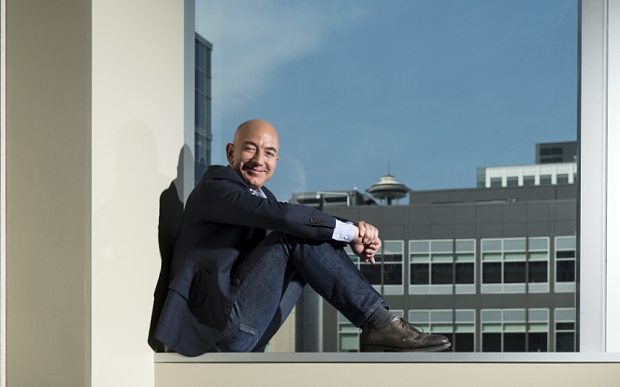Startups
5 Lessons Millennial Startups Can Learn from Jeff Bezos

Of all the entrepreneurs dominating tech today, Jeff Bezos has emerged as one of the few that are still breathing after the .com bubble burst in 2000.
Bezos joined the world of the internet in 1995 and despite the huge crash, Amazon continued to breathe because of his resilience, vision and refusal to give up despite facing humongous odds. Many call him America’s foremost CEO, after Steve Jobs.
Here are 5 takeaways from Bezos’ philosophy:
1. The empty chair philosophy
During Amazon’s early days, Bezos insisted on placing an empty chair in each executive meeting. To all attendees, this was Amazon’s customer and the empty chair was to act as a reminder that no decision they made should displease the most important attendee of their meeting.
From the get-go, Bezos has been pretty clear about his desire to make Amazon a customer-obsessed firm. This customer-centric philosophy is what has made Amazon the world’s foremost e-commerce firm. Millennials will do well to remember that no matter how old, the “customer is king” belief still holds true.
“The best customer service is if the customer doesn’t need to call you, doesn’t need to talk to you. It just works.” – Jeff Bezos
2. Apologizing shouldn’t hurt your ego
Back in 2009, Amazon angered users by deleting legally bought copies of George Orwell’s “Animal Farm” and “1984”, because they were being sold illegally by an unnamed seller. For any firm, this would probably be deemed as a mid-level crisis.
For Bezos, however, anything that hurt his customers, hurt him. Therefore, he personally penned an informal apology letter to all users. He said, “Our ‘solution’ to the problem was stupid, thoughtless, and painfully out of line with our principles…we will make better decisions going forward[.]”
As a startup, you may feel that admitting a mistake may lose customers but refusing to do so will push them further away. In the example stated above, most firms would have simply released a press statement to apologize for the error. The worst ones would adamantly deny they were at fault. When the mistake first occurred, customers were furious. Bezos’ heartfelt plea for forgiveness won them over.
3. The two-pizza philosophy
Jeff Bezos is a firm believer in small, sovereign units. In his own words, if a team cannot be fed by two pizzas, it’s too large. In statistical terms, a team must comprise of 5 – 7 people. The Amazon Gold Box, for example, was an idea that originated during one of these two-pizza team discussions.
This attitude correlates with Bezos’ other active belief – the constant removal of waste. According to him, large teams become inefficient and usually find it hard to come to a decisive result, wasting resources along the way.
Unsurprisingly, this idea has been catching on as small businesses continue to sprout online. Firms, like AMZInsight, prefer assigning tasks to a small group of people. It gets the job done quickly and allows ideas to flow freely.
4. It’s the long-term that matters
When Amazon makes a gigantic investment, they’re almost always criticized. Ten years down the line, when the investment pays off, the same critics sing Bezos’ praises.
If a strategy or plan seems revolutionary to him, Bezos shrugs off the disapproval. He can wait half a decade to get a return on his investment but if something feels right to him, he’s got to do it now. For example, when eBooks were first introduced, Amazon was the only store to offer them at prices lower than their print editions, generating short-term losses.
Today, all eBook editions are cheaper but because of an early start, Amazon has already captured most of the market. Therefore, if you believe something will work, go for it and don’t worry about short-term returns.
“A brand for a company is like a reputation for a person. You earn reputation by trying to do hard things well.” – Jeff Bezos
5. Failure is a prerequisite to innovation
As mentioned above, Amazon began when the internet was still a baby and online commerce was growing on uncertain soil. Bezos went in fully aware of the failures waiting for him. He told his first investors that: “…there’s a 70 percent chance you’re going to lose all your money, so don’t invest unless you can afford to lose it.”
However, instead of feeling limited by imminent failure, Bezos felt powerful. He knew he was going to fail but he also knew that nothing would stop him from pushing Amazon off the ground. He felt liberated since he knew what the future held for him. Ironically, it was this mentality that set shop for his success. Expect failure but don’t let it hinder your plans. Instead, prepare to face it head on.
What have you personally learned from Jeff Bezos? Please share your thoughts in the comment section below!
Shift Your Mindset
10 Powerful Traits Every True Thought Leader Possesses
In a world saturated with noise, thought leadership is the quiet power that shifts paradigms.

Thought leadership is more than just having strong opinions. It’s the ability to influence, inspire, and guide others by sharing original insights, innovative ideas, and deep domain expertise. It’s about sparking change, not just talking about it. (more…)
Startups
The Young Man’s Guide to Creativity: 10 Daily Habits to Improve Your Creative Mind
10 daily habits you can put into practice right now to improve your creativity

When I was 22 years old, I became a Top Writer on Medium.
It’s not an easy path. I lived in the Philippines and had never received a penny after writing over 100 digital articles. But I treated it like practice. If I couldn’t get other people to read my work for free, why would they trust me? (more…)
Startups
If You’re Not Reinventing Yourself, You’re Falling Behind! Here’s What To Do
Reinvention is the secret weapon of high performers.

Reinvention is the secret weapon of high performers.
Most careers follow a predictable script. You start at the bottom, climb the ranks, and eventually settle into something resembling stability. But the people who make the biggest impact, the ones who don’t just play the game but change it, break that script. They evolve. They shift. They reinvent. (more…)
Startups
The Silent Killer of Startups: This Might Be Draining Your Profits
If you are careless in managing your inventory, it can lead to a sudden depletion in cash flow

There are several issues in a startup, but if you are really careless in managing your inventory, it can lead to a sudden depletion in cash flow. Old, broken, and misplaced stock wastes space and profits. If inventories and storage aren’t managed properly, it hardly ever works.
-

 Shift Your Mindset4 weeks ago
Shift Your Mindset4 weeks ago11 E’s That Define Every Great Leader And Why Most People Miss Them
-

 Did You Know3 weeks ago
Did You Know3 weeks agoThe Success Patterns You Inherited (And Didn’t Notice)
-

 Entrepreneurs3 weeks ago
Entrepreneurs3 weeks agoThe Essential Skills Every Entrepreneur Needs In 2026
-

 Business3 weeks ago
Business3 weeks agoThe Hidden Money Pit in Your Operations (and How to Use It)
-

 Change Your Mindset2 weeks ago
Change Your Mindset2 weeks agoHow to Turn Your Mind Into Your Greatest Asset (Instead of Your Enemy)
-

 Change Your Mindset2 weeks ago
Change Your Mindset2 weeks agoThe Silent Skill That Makes People Respect You Instantly
-

 Life1 week ago
Life1 week ago10 Research-Backed Steps to Create Real Change This New Year
-

 Tech1 week ago
Tech1 week agoWhat’s in a Name? How to Get Your Domain Right


























2 Comments